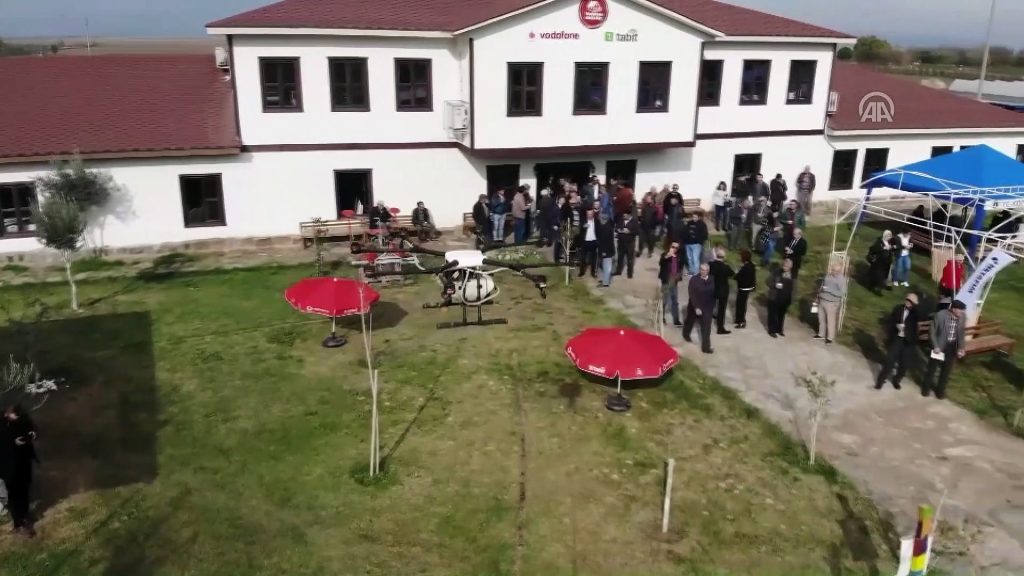
Project Overview
The Smart Village Project is an innovation initiative integrating technology and artificial intelligence in agriculture. It aims to increase efficiency in the agricultural sector, ensure the optimal use of resources, and provide technological support to farmers. The project envisions an ecosystem that combines a Agricultural Monitoring Center, Smart Irrigation Systems, IoT technologies, sensors, and software.
Globally, there are over 570 million farming families, producing 80% of total food (FAO reports).
Smart Village merges traditional farming with advanced technology to enable efficient production while improving farmers’ quality of life through information and communication technologies.
Project Problem Area
Agriculture faces multiple challenges, including productivity, efficient use of water and other natural resources, climate change, and environmental factors. These issues affect both the sustainability of farming and food security. The Smart Village Project addresses these challenges by integrating technology and data analytics into agricultural practices, creating a more efficient and sustainable farming model.
Social, Economic, and Environmental Impacts
Social Impact: Increased access to technology enables farmers to manage their production more efficiently, improving working conditions and income levels.
Economic Impact: Smart Village enhances productivity, reducing costs and increasing yields, thereby contributing to economic growth in the agricultural sector.
Environmental Impact: By optimizing water and resource use, the project reduces environmental impacts. Smart agricultural practices minimize chemical usage and save water.
Economic Targets:
≥20% savings in crop production costs
≥22% savings in livestock costs
30% increase in livestock income
10% increase in overall production
Environmental and Social Targets:
≥20% water savings through efficient irrigation
Prevention of soil and water pollution from incorrect pesticide and fertilizer use
Improved rural quality of life and sustainable economic empowerment
Tabit Strategy
The Smart Village Project seeks to motivate youth in agriculture, prevent rural-to-urban migration, promote digitalization in villages, implement new agricultural technologies, and establish an international agricultural technology hub as a model for other countries.
The Agricultural Solution Center collects and analyzes agricultural data, offering actionable recommendations to farmers. Expert consultancy is also provided, enabling better farm management and optimized production.
Project Uniqueness and Goals
Integration of AI and IoT technologies to maximize agricultural efficiency.
Centralized Agricultural Monitoring Center manages and analyzes nationwide agricultural data, providing actionable feedback to farmers.
Cloud-based system allows farmers to access real-time sensor data from the field anywhere.
Project Business Model
Technology Integration: Development of smart agricultural applications using IoT and AI, offered to farmers and agricultural experts.
Data Collection and Analysis: Centralized platform analyzes data from sensors and software to provide optimized farming strategies.
Consultancy Services: Agricultural experts guide farmers on best practices and efficient decision-making.
Cloud-Based Software: Farmers access agricultural data and analyses remotely via mobile devices.
Project Activities and Promotion
Events, fairs, seminars, and media campaigns are organized at the Smart Village Campus to promote the project.
Sustainability Goals
Increase agricultural productivity and efficiency
Reduce environmental impacts
Expand farmers’ access to technology
Widespread adoption of agricultural technologies
Continuous data collection and analysis to provide up-to-date recommendations
SDG Impacts
No Poverty: Supports small family farmers in rural areas, increasing income and productivity, preventing poverty and rural migration.
Zero Hunger & Food Security: Education and technological support reduce post-harvest losses by up to 30%, contributing to food security.
Good Health & Well-being: Enhances farmers’ health and quality of life, prevents work-related injuries, and provides sports facilities and health awareness programs.
Quality Education & Lifelong Learning: Offers literacy, financial literacy, and technology education for farmers of all ages.
Gender Equality: Empowers women farmers through awareness programs and agricultural entrepreneurship training.
Clean Water & Sanitation: Provides knowledge on efficient irrigation and fertilization, supported by AI systems and early warning environmental alerts.
Sustainable Energy: Promotes solar-powered drying systems and mobile milking technologies.
Decent Work & Economic Growth: Automates and simplifies farming processes, improving productivity and economic growth.
Industry, Innovation & Infrastructure: Provides affordable R&D opportunities and innovative farming methods.
Reduced Inequalities: Expands technology access to low-income rural farmers.
Sustainable Cities & Communities: Increases rural welfare and prevents migration.
Responsible Consumption & Production: Guides farmers toward efficient and sustainable production methods.
Climate Action: Promotes modern farming techniques to protect soil, water, and natural resources.
Life Below Water: Reduces water pollution through proper fertilizer and pesticide management.
Life on Land: Promotes eco-friendly practices to protect ecosystems, forests, and biodiversity.
Peace, Justice & Strong Institutions: Replaces child labor in farming with education and development opportunities.
Partnerships for the Goals: Encourages global collaboration among international companies, universities, local governments, NGOs, and farmers, strengthening knowledge and resource sharing.
